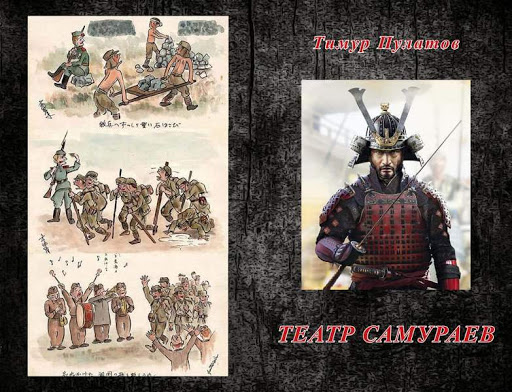A prominent writer, author of iconic works on the Crimean theme, written in 2015-2017 about Noman Chelebidzhikhan (“Say no to death!”), Musa Mamut (“The Story of a Return”), and about dramatic events in the Red Paradise in the autumn of 1992 (“Expulsion from Paradise”).
Timur Pulatov during his last visit to Crimea in September last year, as you know, presented his new novel under the intriguing title “Samurai Theater”.
The action of the novel mainly takes place in Tashkent, on the constructions site of one of the symbols of the current capital of Uzbekistan, the Theater of Opera and Ballet named after Alisher Navoi. Many know that this magnificent, architecturally original building erected by proud samurai army. Former soldiers of the Kwantung Army, there were more than a half a million of them in the Soviet Union.
In parallel with this central plot of a non-banal construction site, another story branch of it takes place, in which Lieutenant Asan Kurtchi, a native of Crimea, a participant in a fierce three-week war with the Japanese, meets with them every day at the construction of a theatre in Tashkent.
The translator from Kwantung, Kimura, who provides contacts between masters-employers and employees, his fellow prisoners of war, is aware of how insidiously and vilely the Soviet regime treated Crimeans and understands the obviousness. In essence, the position of the valiant lieutenant, a representative of the repressed people, is not much better than captive masters of hara-kiri, and that now he can hardly be considered even a small winner in that war, because he lost a lot during its completion, turning out to be a special settler.
The situation is aggravated by the fact that Asan, who learned about the death of his wife, as a seasoned scout, desperately, but purposefully and even systematically searches for his nine-year-old son Eyub, who ended up in one of the dozens of orphanages scattered throughout the then Soviet Central Asia. Not by chance, he became friends Shaykhov in the Mongolian hospital, after the riot of anxious inmates of Samurai camp. And Shaykhov whispers to him: “And you, my friend, should also rise… rise and then you will be heard…”.
So, the newspaper “Qırım” began to translate this novel at the end of last year, and from 12-February of this year, the new publication was released. “Samurai Theater” is a work not only with an exciting plot but also very informative. It is evident that the author has studied a lot of literature about the country as a rising sun, got acquainted with the dramatic history of the construction and unique style of the capital’s theatre.
At the beginning of the book Timur wrote the following: “In good memory of Zekiye Shamileva dedicated.” Let us explain to those who may not know. Zekie is a representative of a generation whose youth was taken away by war and deportation. She is the wife and ally of Fazyl Ametov (1917-1984), who is one of the active participants in the national movement.
I do not know whether Timur Pulatov tempted to dedicate the novel to the spouse of 124th Emperor Hirohito (1901-1989) Empress Kōjun (65 years of marriage!). Who inspired and supported him to surrender in time, the deed that saved the country and its millions of people for the future reproduction of the population and the creation of progress in the form of a Japanese miracle. But the dedication of the book to the mother of one of the families, the head of which together with like-minded people, among which, most likely, was Lieutenant Amet Kurchi, also did everything in their power to save and return Crimeans to the land of their ancestors.
Read about the Crimeanized “Samurai Theater” in the Crimean language in the newspaper “ Qırım”, Bekir MAMUT





